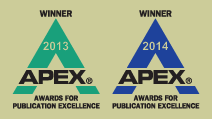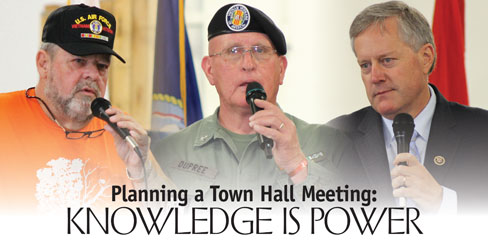 |
||||||||||||
|
September/October 2015
BY BOB HOPKINS “I was angry,” said Mokie Porter, VVA’s director of communications. Nancy Switzer, past president of the Associates of Vietnam Veterans of America, went a step further: “I was furious.” Both women were referring to a report released in June 2009 by the National Organization on Disability, funded by the Ford Foundation. It was part of a national campaign to look at the needs of Vietnamese and their offspring affected by the spraying of Agent Orange and other toxic substances during the Vietnam War. Although there were references to health problems in Vietnam veterans and their offspring and recommendations to address those issues, they were not to be included in the publicity campaign. Soon after, a discussion forum was held at VVA’s 2009 National Convention, organized by AVVA. It was the start of what became known as Agent Orange town hall meetings, the first of which was held by Centralia, Ill., Chapter 176 on April 8, 2010. The purpose of these meetings is to highlight the issue of health problems of Vietnam veterans and, particularly, their children and grandchildren, associated with exposure to toxic substances. They are also an important vehicle to push for legislation for research and treatment of those offspring. Additionally, veterans attending the meetings are given the opportunity to file claims with the VA, as are their children. Logistics and planning are essential for a productive meeting. Initial coordination should be with Mokie Porter at VVA’s national office. She provides guidance on setting up the meetings, local contacts knowledgeable about the Agent Orange issue, and packets to be distributed at the meetings. The packets contain copies of the Faces of Agent Orange campaign and The VVA Self-Help Guide to Service-Connected Disability Compensation for Exposure to Agent Orange, along with other materials. More than 35,000 self-help guides were distributed last year. The publications are available online at VVA’s website. Lead time for the presentations is measured in months. A date that likely will attract the largest number of veterans and a centrally located meeting place that can handle one hundred or more people should be chosen. Ample parking is also a requisite. Barry Rice, VVA Tennessee State Council president, likes Tuesdays. “We get the largest attendance on that night of the week,” he said. “We average two hundred people per meeting.” Rice has used the concept of the town hall meetings to address the issue of PTSD and suicide. Dennis Beauregard, New Jersey State Council president, prefers Sundays. Experience in his state has shown that to be the best day, especially for panel participants. When securing a facility, local contacts can cut overall costs. Rice recommends looking for a church hall or school. “We’ve never had to pay for a hall,” he said. Many chapters already have connections with other service organizations’ facilities. Makeup of the panels varies from state to state, but there is a common thread. The moderator has to have a working knowledge of the Agent Orange issue. He must be able to control the tempo and direction of the meeting while allowing everyone to have a say. She must be diplomatic, especially when raw emotions are involved. Service officers are critical to the success of the meetings and should be available to answer questions and to initiate claims. Dave Simmons, West Virginia State Council president, said the VA has accused him of helping file frivolous claims for children of exposed veterans. “We will continue to file these claims, over seven hundred so far,” he said. “We know they’ll be denied, but they provide a basis for possible future action.” Herb Worthington, former chair of the Agent Orange/Dioxin and Other Toxic Exposures Committee, also encourages members to file claims for their offspring. Panels may include medical professionals, local veterans who have children with disabilities, and Agent Orange activists. In addition, VVA National can send people to participate. The panels average five to seven people. Once a date has been set and a facility secured, publicity is critical to success. North Dakota used billboards with funds provided by the state legislature. Worthington encourages the use of public service announcements and “local ingenuity” in advertising. Contact with other veterans service organizations, use of press releases, and notices on social media all help. Determine what audiovisual equipment will be needed. Large halls require sound systems. This equipment should be tested well in advance of the meeting. Funding for the meetings varies. Ben Humphries, Florida State Council president, has the host chapter contribute $500 and the state council matches it. If there is a shortfall, he uses money from a foundation. “We have a ‘Faces of Agent Orange Rock Star Tour’ twice a year,” he said. “We hit five or six cities in a week’s time. Total cost runs between five and six thousand dollars.” In New Jersey the local chapter underwrites the cost of the meeting. In West Virginia, the state council pays for it. Tennessee asks for support from local businesses and organizations. Conducting meetings has a local flavor. Rich Lindbeck, Wisconsin State Council president, uses a three- or four-person team. Each relates his or her story and then the audience is invited to participate. All are asked to send their accounts to Porter for possible inclusion in the Faces of Agent Orange project. Audience participation is always encouraged. Attendees also are urged to ask their representatives in Washington to support the Toxic Exposure Research Act of 2015 (H.R. 1769 and S.901), which will establish within the VA a national center for research on the diagnosis and treatment of the health conditions of the descendents of veterans exposed to toxic substances. In addition, any veteran who has offspring with disabilities or illnesses associated with Agent Orange exposure is asked to have that child or grandchild take part in the National Birth Defect Registry being compiled by Birth Defect Research for Children. At the end of the meeting it is important to collect the sign-in sheets, which should contain the names, addresses, phone numbers, and email addresses of every attendee. This information can be used for follow-up contacts, asking for feedback on the meeting, and suggestions for future meetings.
|
||||||||||||
|
|
||||||||||||
|
||||||||||||
8719 Colesville Road, Suite 100, Silver Spring. MD 20910 | www.vva.org | contact us |
||||||||||||


















